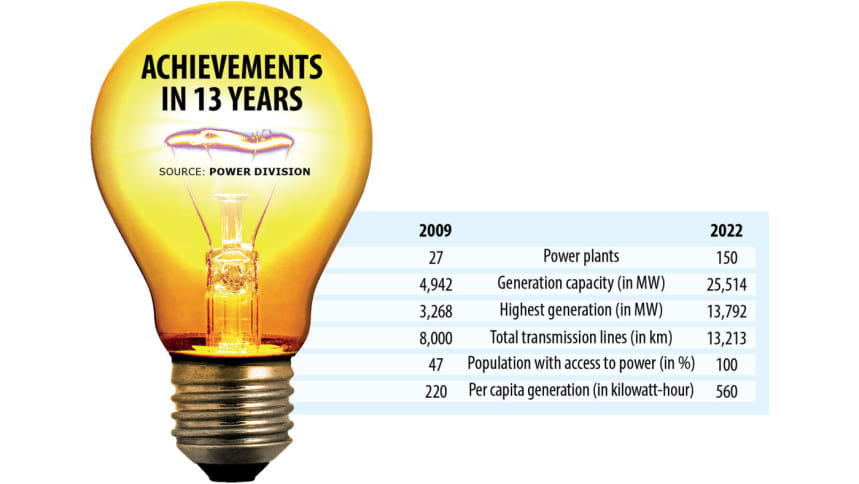100pc population now under electricity coverage

Bangladesh has achieved yet another milestone as the government is set to announce that it has brought 100 per cent of the population under electricity coverage.
"Prime Minister Sheikh Hasina will announce it formally at a programme on March 21," Nasrul Hamid, state minister for power, energy and mineral resources, told reporters at a programme at the Bidyut Bhaban in Dhaka yesterday.
"We have already taken electricity to remote areas. All the homes except those under construction are reaping the benefit of electricity."
"We have taken electricity lines to the remote areas like Rangabali in Patuakhali and Hatia and Nijhum Dip in Noakhali," said Md Habibur Rahman, power secretary.
The achievement will put Bangladesh ahead of India and Pakistan, among the countries in South Asia, that have brought 98 per cent and 74 per cent of their population under electricity network, data from the World Bank showed.
Bangladesh has made impressive strides in the power sector in the last decade.
Installed power generation capacity rocketed to 25,514 megawatts from 4,942MW in 2009, while the maximum power production rose to 13,792 MW, up four-fold from 3,268MW13 years ago, data from the power division showed.
In 2009, only 47 per cent of the population had access to power. Per capita power generation more than doubled to 560 kilo-watt-hour from 220 kWh during the period, making a frequent power outage a thing of the past.
Experts hailed the achievement.
While speaking to The Daily Star, M Tamim, an energy expert and a professor of the Bangladesh University of Engineering and Technology, described 100 per cent coverage as a major milestone for the country.
"People have come under electricity coverage. This is a good achievement."
Khondaker Golam Moazzem, research director of the Centre for Policy Dialogue, said: "It is a major achievement of the government."
"The government has set a target to bring the entire population under electricity coverage. It has worked in the last one decade to attain the goal."
The success in the power sector has also helped the government take the economy to a new height.
"The economic success is not only seen in cities – it is also visible in rural areas," said Moazzem.
Both Prof Tamim and Moazzem remind the challenges that lie ahead for the government.
"Now, we will have to ensure an uninterrupted power supply. Electricity will also have to be affordable," Prof Tamim said.
"Electricity has been taken to the people in the remote areas. If they can't afford it, then having the power network will not make any difference," he said.
Moazzem said the government has been able to take electricity connections to the people, but the country is lagging when it comes to the availability of power.
"Availability of power is still low given the capacity," he said, referring to more than 40 per cent excess power generation capacity.
He urged the government to bring down excess expenses that are being incurred in the form of capacity payments, for the operations of inefficient power plants and for the use of expensive fuels.
In the coming decade, the government will have to attempt to move to renewable energy, cutting reliance on fossil-fuel-based power generation in phases.
"We will have to make improvements in the areas of transmission and distribution systems as well," said Moazzem.
The economist urged the government to reform the power sector policy, moving away from the emergency power supply laws to a competitive power system.
Referring to a study of the Bangladesh Institute of Development Studies, Prof M Shamsul Alam, energy adviser and senior vice-president of the Consumers' Association of Bangladesh, says 10 to 15 per cent of people could not access electricity in many areas even though the areas were brought under electricity coverage in the past.
"The government has made electricity available for the population. Lifeline tariffs have been extended to provide power at concessional rates. Why are some people still failing to reap the benefit of the expansion in electricity coverage?"
Prof Alam says people still use kerosene to light lamps. "This is one of the indicators that say many people don't have access to electricity."
At the event, Nasrul Hamid said the prime minister would inaugurate the 1,320MW coal-based power plant in Payra of Patuakhali on March 21.
The power plant will have less impact on the environment than a brick kiln. It will be a Bangladesh-China joint venture, he added.
The state minister said the government is incurring huge losses while importing fuel and liquefied natural gas (LNG) due to Russia's war against Ukraine.
"Bangladesh Petroleum Corporation is losing Tk 80 crore a day," he said, adding that the government is still trying to keep the price of fuel and gas stable even by providing subsidies.
"But if the loss widens, the government may change its decision."
Mentioning his recent visit to Qatar, Hamid said they have given a proposal to Qatar to import 1.8 billion per million British thermal units (MMBtu) of LNG under a long-term agreement.
"Qatar will give its decision within a couple of days," he added.
About the capacity of power, Hamid said the gap between peak hours and off-peak hours is about 6,000MW.
"The demand for power is increasing by 200MW every day. So, we have to raise the generation capacity based on the rising demand."
Hamid said many experts criticised the government, arguing it is making capacity payments as it can't utilise the generation capacity.
"But this is part of the investment."
The 30 to 40 per cent reserved capacity is aimed at meeting power demand during peak hours and emergencies. "Otherwise, we will not be able to ensure uninterrupted electricity supply across the country," he said.
The developed countries such as the US and Japan maintain a 100 per cent additional capacity, he added.

 For all latest news, follow The Daily Star's Google News channel.
For all latest news, follow The Daily Star's Google News channel. 



Comments